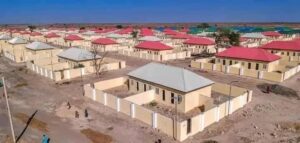


Tinubu’s one year in office: Property developers adjust project designs due to surging costs
…Residential property prices increase by over 20%
…As investors remain cautiously optimistic
By Esther Agbo
Since the inauguration of President Bola Ahmed Tinubu, Nigeria’s property market has witnessed significant shifts, reflecting broader economic trends and policy changes.
This feature explores the surge in property prices, the urban-rural divide, government policies, reduced national productivity, business difficulties, investment sentiment, and the challenges and prospects facing the real estate sector.
The real estate sector has faced numerous challenges in areas such as development, material procurement, marketing, financing, and cost of capital.
A recent Northcourt Real Estate report indicates that property prices are expected to adjust in response to these changes, with the construction industry adapting its projects accordingly.
The report highlighted that project designs, especially in the mid to low-income residential segments of major cities, will need to adjust. The high cost of capital, weak overall demand, and narrow profit margins are driving demand for smaller lot sizes and more intensive land use.
However, some policy changes by the Tinubu government have had several specific impacts on the property sector.
The increased short-term costs are likely to drive low-risk market participants towards safer investments, such as government securities with higher returns. However, opportunities for new long-term investors may arise as the benefits of foreign exchange harmonisation and fuel subsidy removal become evident.
What about the increased Infrastructure Development?
The removal of fuel subsidies presents an opportunity for the government to redirect funds previously spent on subsidies towards critical sectors like healthcare, education, agriculture, and defence, potentially boosting infrastructure investments.
Moreover, rising costs for construction materials, labour, and transportation may lead to more abandoned projects. Refinancing ongoing housing developments could become challenging, leading investors to reconsider their commitments and possibly pause their plans.
Housing Projects may face delivery delays due to foreign exchange policy changes and funding difficulties, with developers opting for more affordable construction and finishing materials. The supply chain disruptions caused by the removal of the fuel subsidy could further delay property deliveries.
Higher transportation costs due to subsidy removal have led to increased living expenses, prompting residents to stay closer to home, share apartments, or live with friends.
This population density increase is expected to drive demand for co-living spaces in crowded urban areas.
The surge in property prices
Under President Tinubu’s regime, property prices have surged remarkably. Key urban centres like Lagos, Abuja, and Port Harcourt have seen property values skyrocket, driven by increasing demand and limited supply.
According to recent data, the price of residential properties in Lagos has increased by over 20 percent within the first year of Tinubu’s administration. This sharp rise is attributed to various factors, including heightened investor interest, inflationary pressures, and the rising cost of building materials.
The disparity between urban and rural property markets has widened significantly. In cities, the demand for housing and commercial properties continues to grow, fueled by urban migration and economic opportunities.
Conversely, rural areas have seen slower growth, hampered by inadequate infrastructure and lower investment levels. This urban-rural divide underscores the need for balanced development policies to ensure equitable growth across the nation.
Government policies and real estate
The Tinubu administration has introduced several policies aimed at revitalising the economy, some of which have directly impacted the real estate sector.
The government’s focus on improving infrastructure, such as roads and power supply, has boosted property values in areas benefiting from these projects.
Additionally, efforts to streamline land registration and titling processes have been well-received, although implementation challenges remain.
However, some of these policies have had unintended consequences. The removal of fuel subsidies, for example, has increased transportation costs, indirectly affecting the prices of building materials and, consequently, property prices.
Investor sentiment in Nigeria’s property market remains cautiously optimistic. While the long-term outlook is positive, speculative activities have led to inflated property values, particularly in prime urban areas.
Many investors view real estate as a hedge against inflation and currency depreciation, further driving demand. However, this speculation has also made affordable housing increasingly out of reach for the average Nigerian.
The cost of building materials
The skyrocketing cost of building materials is also a major concern. Cement prices have reached unprecedented levels, significantly impacting construction costs. Sand, granite and block prices have also risen, driven by increased demand and transportation costs.
In response to the rising cost of construction, BUA Group pledged to reduce cement prices. This promise has been met with cautious optimism, as many in the industry are keenly watching to see if these price cuts will materialise in the market and provide the much-needed relief to developers and builders.
Challenges facing the property sector
The property sector is facing several significant challenges, including High Construction Costs. The cost of essential building materials such as cement, sand, and blocks has soared. Cement prices, in particular, have been a major concern, with prices doubling in some regions over the past year.
Land Acquisition and Titling Issues is another challenge, obtaining land and securing proper titles remain cumbersome and fraught with bureaucratic hurdles. These challenges deter potential investors and delay property development projects.
Economic Volatility cannot be exempted as Inflation, currency instability, and fluctuating economic policies continue to pose risks to the sector. The unpredictability of these factors makes long-term planning difficult for developers and investors alike.
The way forward
Addressing the challenges in Nigeria’s property sector requires a multifaceted approach, starting from Policy Reforms, which involves continued efforts to streamline land acquisition and titling processes are essential. Simplifying these procedures will attract more investment and expedite property development.
Also, investing in infrastructure, especially in rural areas, will help bridge the urban-rural divide and stimulate growth across the country.
The government and private sector must collaborate to stabilise the prices of building materials. Initiatives like BUA’s promise to reduce cement prices should be supported and monitored to ensure they deliver tangible benefits.
Implementing policies and programs that promote affordable housing can help mitigate the impact of rising property prices on the average Nigerian, while ensuring macroeconomic stability, predictable and consistent economic policies will foster a more favourable investment climate, benefiting the property sector.
Though The Tinubu regime has seen a surge in property prices and heightened investment interest, significant challenges remain.
Addressing these issues through comprehensive policy reforms and strategic investments will be key to unlocking the full potential of Nigeria’s property market.



